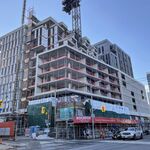We agree there's a problem, and that its consequential and that governments are at best lacking motivation in their response.........BUT.....
You often express your thoughts as if this were unique to Canada.
Lets have a look at where Toronto is in terms of Price to Income Ratio: (ratio for our purposes is left hand column, and lower is more affordable. Its roughly the factor of housing price to median income. (across all housing types)
View attachment 389042
* note all the numbers above skew low when I do the calculations individually so are probably a few years out of date. However, the relative ranking seems to be fairly constant.
ie. Toronto is now just over 13, while SF is now ~10
****
In terms of relative affordability of housing, we're number 299 in the world. Slightly less affordable than Naples, but more affordable than Madrid.
That is not said to diminish the very real issue here; but rather to point out that its actually a global issue in many respects.
Lets all look at this another way.
The expensive cities in the U.S. that rank better than us on affordability.
San Fran is 7.12
Yet, their housing prices are worse than ours at 1.488M U.S. for a median price that's $1,877,000 CAD
So how it can be more affordable? Income! That's how.
Median Household Income in SF is $120,000USD or $150,000CAD
Median Household income in Toronto is ~$75,000 CAD in the region (lower in the City proper)
Now SF is also pricing many citizens out of the City, its also got an acute homelessness problem...........so I'm not holding them up as a role model per se.
Rather, I'm noting that to the extent that they read as more affordable than Toronto that's a function of income not price.
*****
Financialization of housing is a global phenomenon not unique to Canada.
But we're suffering from it here just the same; and moreso than many other developed areas because our incomes are too low, and there is insufficient deeply affordable housing as well.
All of which is to say, housing affordability is not an issue unique to Canada, its just somewhat worse than many (not all) of our comparitors, but most of that difference is lower income, not higher price.
****
The developed world needs to target the housing side, Canada included. But Canada, somewhat more uniquely, needs to target income growth.






